—————
[Note: This outdated post remains as a record
of the first intentions for the event
and its first six months of preparation]
2025 RGME Autumn Colloquium
at the University of Waterloo
“Break-Up Books
and Make-Up Books:
Encountering and Reconstructing
the Legacy of Otto F. Ege
and Other Biblioclasts“
Friday to Sunday 21–23 November 2025
in Hybrid Format (pending funding)
or Online by Zoom
Colloquium ‘Home Page’
for information and updates
[Posted on 5 January 2025, with updates. As of June 2025, the University of Waterloo is not a co-sponsor or host for the event, which retains its structure, but not that location or partner. See the newer link listed above.]
“Yet will I leave a remnant, that ye may have some that shall escape the sword among the nations, when ye shall be scattered through the countries”
— Ezekiel 6:8

Waterloo, University of Waterloo, DRAGEN Lab, Vellum Leaf from a Book of Hours, Recto.
By request, in collaboration with the University of Waterloo, the RGME prepares a special 2025 Autumn Colloquium on the phenomena of widely dispersed remnants of dismembered manuscripts and other written materials scattered at the hands of biblioclasts such as Otto F. Ege (1888–1951), for a variety of purposes more and less laudable. We will showcase work being done in various centers and by many individuals on these materials, as part of long-term, laborious, significant, and sometimes dispersed research to identify, reclaim, and, insofar as possible, virtually reconstruct the originals and place them in context.
We seek to gather perspectives on the challenges and opportunities presented by the dispersed manuscript or other materials which survive, albeit disordered or reordered, after passing through the hands of collectors-turned-biblioclasts, for whatever reasons.
A main focus, given the number and variety of projects dedicated to them, will be the manuscripts and other materials dispersed by Otto F. Ege and his collaborators, notably his wife/widow Louise and the New York book-dealer and book-breaker Philip C. Duschnes (1897–1970). Yet, not least because many of their remnants have joined or become intermixed with fragments dispersed by others and through diverse processes in varied collections, it is worthwhile to consider that complex factor for their effective study as well.
We seek to showcase the work of these projects, compare notes about issues and methods of research, and set the legacy of those biblioclasts in the context of others working as predecessors, contemporaries, or followers, as they also redirected the course of manuscript and related studies by disrupting and dislocating its evidence.
The ‘delivery methods’ of dispersal range from assemblages of sets of fragments as specimens in Portfolios, Leaf-Books, Albums, Scrapbooks, or Loose Leaves which might circulate in mats with or without labels, on their own, or in groups sans identifying information. In effect, many of these remnants were cast out on their own as no-name ‘orphans’ whom expertise, serendipity, and circumstance might recognize as ‘foundlings’ or find forever homes, whether virtual or actual. (See The “Foundling Hospital” for Manuscript Fragments.)
Our Colloquium highlights the processes of recovery by multiple, interlinked, and interlocking means, as we gather representatives from the fields of manuscript studies and fragmentology to share their stories, processes, progress, and accomplishments.

New Haven, Yale University, Beinecke Rare Book and Manuscript Library, Otto F. Ege Collection, Leaf in Ege’s Mat from ‘Ege MS 14’. Opening page of the Apocalypse / Revelations in a large-format Lectern Bible in the Latin Vulgate Version. Photograph by Mildred Budny.
Scope
The University of Waterloo and the RGME propose to co-host an international Colloquium with hybrid functionality, for access by a wide audience with interests in multiple subjects. Our two educational organizations in Canada and the United States respectively combine experience and skills to produce a scholarly event with companion publications pre- and post-event, to promote and disseminate research work and discoveries in multiple, interrelated fields of study.

Waterloo, University of Waterloo, DRAGEN Lab, Vellum Leaf with music and notation for liturgical chants: Recto.
Our plan takes its starting point from the wish to gather expertise and perspectives from a different collections of manuscript materials — such as at the Medieval DRAGEN Lab (Digital Research Arts for Graphical & Environmental Networks — and the rich variety of new and long-term projects (both institutional and individual) dedicated to research on the medieval Western manuscripts despoiled and dispersed by Otto F. Ege and his collaborators.
These initiatives include the new project by the Cantus database (Cantus: A Database for Latin Ecclesiastical Chant – Inventories of Chant Sources) to produce a database of the musical manuscript fragments in Ege’s Portfolio of Fifty Original Leaves from Western Manuscripts (FOL). This notorious Portfolio was issued in multiple sets now widely dispersed in public or private collections through North America and beyond. Like others of Ege’s Portfolios, some sets are lost, or lost track of; some have themselves become fragmented, as parts have been removed, as specific manuscript specimens were further disjointed from their relatives, original or newer companions in the biblioclasts’ assemblages. Some of these ‘orphans’ or cast-offs have lost their identifying Ege mats or labels, further to complicate the issues of identification, recognition, and retrieval.
The RGME’s long-term project of research in these fields focuses on the variety of Ege’s Portfolios overall. Dedicated to specific genres of books, such as Famous Books or Famous Bibles, they include not only manuscript fragments but also a multitude of printed materials ranging from incunabula (up to the year 1500) to the twentieth century; all were selected and arranged by Ege and his circle as specimens of the graphic arts and book arts for instruction and display. (For examples, see our blog on Manuscript Studies and its Contents List for Ege materials.)

Private Collection, Leaf from ‘Ege MS 14’. Part of the Book of Jeremiah, Recto, Detail. Photograph by Mildred Budny.
Research on the surviving evidence on many fronts and in multiple centers can bring expertise to bear upon specific genres (such as manuscripts containing music). So, too, it reveals the processes of workshop practices over decades in the destruction, re-constitution, and further distribution of the original books. For example, such elements have bearing upon the provenance of individual fragments and potential impact upon that of other fragments whose provenance might not otherwise be known.

Collection of Richard Weber, Leaf from Otto Ege MS 14, recto. Photograph by Richard Weber.
Given the progress of these and other projects in various centers concerned with Ege’s legacy, the time is right to bring their representatives (established scholars, curators, collectors, and others, as well as younger scholars) together to compare notes, showcase their work, and strengthen contacts between individuals and centers across borders.
By examining the book-breaking practices overall by “Ege & Co.” in the wider context of biblioclasts over time, including many of Ege’s contemporaries, predecessors, and followers, we might gain fuller knowledge of the individually as well as collectively destructive habits and their legacy. Likewise by comparing notes, surveying the results so far of different projects, and, it might be, identifying more of the seemingly lost fragments in unknown or unexpected places, our Colloquium could cross thresholds and open more gateways to wider knowledge.
Such larger contexts provide wider horizons and more comprehensive awareness of the destructive tendencies towards books in given times and places. They can demonstrate, by examination and comparison, the particular characteristics or ‘style’ of the collector, book-breaker, book-seller, and the resulting forms as altered pieces or bodies of evidence for the lost and damaged originals. Among notable predecessors for the genre can be counted the albums of “visually appealing” manuscript fragments created by Samuel Pepys (1633–1703) or the cuttings prepared by John Ruskin (1819-1900) and others.
Examining the complex legacy of these various re-creators of medieval manuscripts and other written materials and the range of projects dedicated to them from perspectives and fields of many kinds, sometimes integrated across a broad spectrum encompassing expertise in the arts and sciences, can advance knowledge in individual projects as well as in wider discourse relating to the transmission of written evidence from generation to generation and century to century, with losses, discoveries, and reconstitutions along the way.
Our focus for the co-sponsored Autumn Colloquium is the legacy of book-breakers, book-destroyers, and book-recreators active in multiple centers in Europe, the British Isles, and North America (at least), with the fragments produced by their activities and transmitted to diverse locations worldwide, often without appropriate identifying information. Our task, as receivers of the evidence from such disruptions, is to make sense of the evidence, identify it appropriately, recognize its characteristics as bodies of witnesses with a complex history, compare information about diverse projects (in many centers) relating to these materials, gather feedback, and disseminate the results to a wide audience.

Waterloo, University of Waterloo, DRAGEN Lab, Vellum Leaf from a Book of Hours, Recto, detail.
Purpose
This 2025 Colloquium stands within the long tradition of symposia, colloquia, workshops, and other scholarly events of the Research Group on Manuscript Evidence, now entering its second quarter-of-a-century as a nonprofit educational corporation based in Princeton, New Jersey. The RGME is dedicated to the study of manuscripts and other written records across the centuries. This year our theme is “Thresholds and Communities”.

Waterloo, University of Waterloo, DRAGEN Lab, Vellum Leaf with music and notation for liturgical chants: Verso.
For the 2025 Autumn Colloquium on 21–23 November, the RGME collaborates with the University of Waterloo and its range of programs and projects, including the Cantus Database and the DRAGEN Lab.
The Advisory Committee for the Colloquium comprises:
- Mildred Budny, Director, Research Group on Manuscript Evidence
- Debra Lacoste, Cantus Database, University of Waterloo; The Institute of Mediaeval Music; Digital Analysis of Chant Transmission, Dalhousie University
- David Porreca, Associate Professor; President, Faculty Association of the University of Waterloo; Co-Director, Medieval Studies Undergraduate Program; Department of Classical Studies and Department of History, University of Waterloo
Spanning three days with half-days on Friday and Sunday, the Colloquium will include a series of sessions with presentations and Q&A, roundtable discussions/panels, hands-on workshops, and exhibitions of several kinds.
To augment the scholarly sessions of presentations and discussions, we plan for displays of original materials in manuscript or other forms and demonstrations of the sounds of music represented in medieval manuscript fragments. Among them is a SoundWalk which allows passersby to access audio recordings of specific musical passages preserved on medieval leaves in collections including the DRAGEN Lab and the Cantus Database.
A Reception ending each day’s sessions will lead from the scholarly program to further conversations.
Participants
Participants represent a wide range of interests, approaches, subjects, centers, and materials.
Speakers, Respondents, Panelists, Hosts, and Presiders
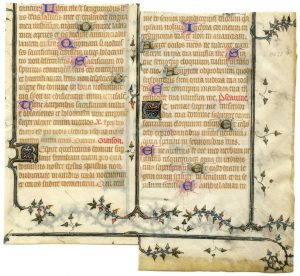
Rejoined Pieces of a Leaf from a Book of Hours. Private Collection. Photography by Mildred Budny.
Participants include (in alphabetical order):
Alison Altstatt (University of Northern Iowa)
Steven Bednarski (DRAGEN Lab, University of Waterloo)
Mildred Budny (Research Group on Manuscript Evidence)
John P. Chalmers (Retired)
Katharine C. Chandler (University of Arkansas)
Lisa Fagin Davis (Medieval Academy of America)
Juilee Decker (Rochester Institute of Technology)
Augustine Dickinson (University of Hamburg)
Scott Ellwood (Grolier Club Library)
Steven Galbraith (Rochester Institute of Technology)
Hannah Goeselt (Massachusetts Historical Library)
Scott Gwara (University of South Carolina and King Alfred’s Notebook LLC)
Elizabeth Hebbard (Indiana University Bloomington and Peripheral Manuscripts Project)
Josephine Koster (Winthrop University)
Debra Lacoste (University of Waterloo, Cantus Database, and Dalhousie University)
David Porreca (University of Waterloo)
Eleanor Price (University of Rochester)
Agnieszka Rec (Beinecke Rare Book & Manuscript Library)
Irina Savinetskaya (Syracuse University)
Kate Steiner (Conrad Grebel University College and University of Waterloo)
Anna Siebach–Larsen (University of Rochester)
Richard Weber (Independent Scholar)
N. Kıvılcım Yavuz (University of Leeds)
And others . . .
Some Results
RGME tradition produces illustrated Program Booklets for major events such as this Colloquium, with participants’ abstracts and selected accompanying illustrations, to grant insider glimpses for our audience (at the event and after) not necessarily familiar with the wide range of subjects and materials under discussion.
A recent example from our 2024 Autumn Symposium “At the Helm” can be downloaded from the RGME website:

Waterloo, University of Waterloo, DRAGEN Lab, Vellum Leaf from a Book of Hours, Recto, with the Opening of the Liturgical Kalendar for the Month of February.
We explore sources of funding and sponsorship for the event as a whole. Information about the results would emerge as these explorations advance. Our aim is to have an in-person event with online access (for speakers and audience) for a fully hybrid colloquium; the online functionality would occur by Zoom Meetings (rather than Webinars with closed access). If funding proves elusive for the in-person facets as well, the event will take place online by Zoom.
We hope to welcome you to the Colloquium.
*****
Note: For information about the RGME Autumn Colloquium as it develops, please continue to visit this ‘Home Page’.
For related RGME events, please see, for example:
Registration
To register for RGME events, please visit:
To register for the Autumn Colloquium, we offer portals to attend online or in person respectively.
1) Register for ONLINE Attendance
2) Register for IN PERSON Attendance
Registration Fees
Circumstances lead us to charge a modest registration fee to attend this 3-day event. The extra costs for preparations in several formats and from different locations require a registration fee to help to offset them.
When you register, we ask you please to add the Eventbrite handling fee for the transaction, as a contribution to the RGME’s costs for this event.
1) General Attendance: $60 US per person
2) Student Discount for Official Students: $35 US per person. When registering for the discount, please let us know your registered affiliation as a student.
The registration fee is waived only for Speakers and Presiders, for whose contributions we give thanks.
We also encourage you to consider adding a Voluntary Donation in support of the RGME, a Section 501(c)(3) nonprofit educational organization principally powered by volunteers. See:
We thank you for your support and your interest in the Colloquium.
*****
Questions? Suggestions?
Visit our Social Media:
Join the Friends of the RGME.
Register for our Events by the RGME Eventbrite Collection.
Among them are the
Please consider making a Donation in Funds or in Kind for our nonprofit educational corporation powered principally by volunteers. Your donations and contributions are welcome, and can go a long way. They may be tax-deductible to the fullest extent provided by the law.
We thank the hosts, co-organizers, advisers, and participants for generously contributing to this Colloquium.
*****

Waterloo, University of Waterloo, DRAGEN Lab, Vellum Leaf from a Book of Hours, Verso.


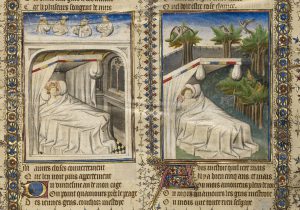






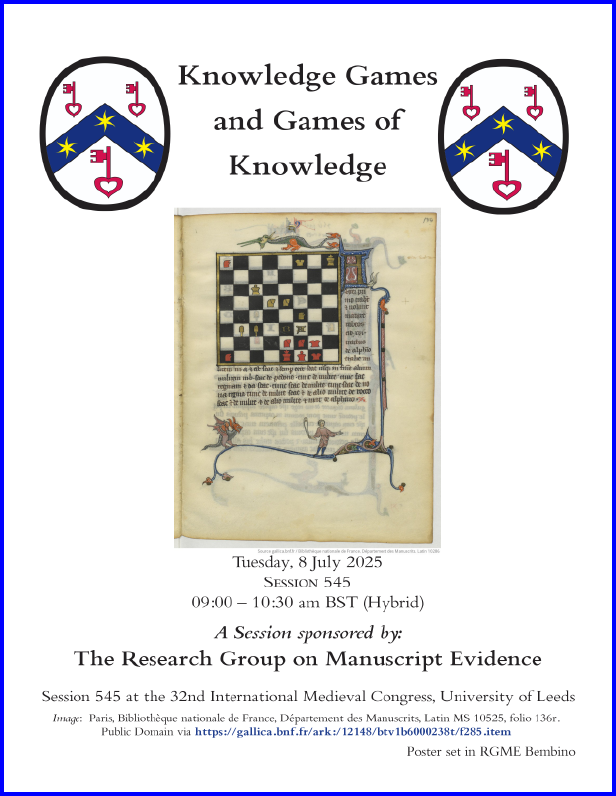
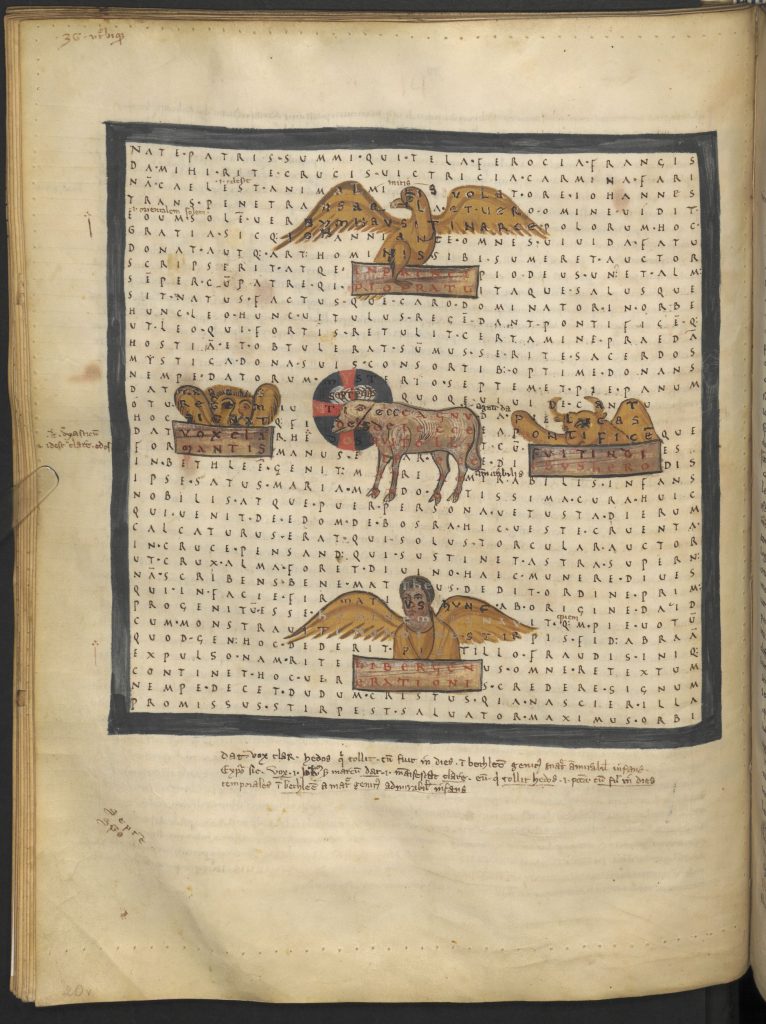
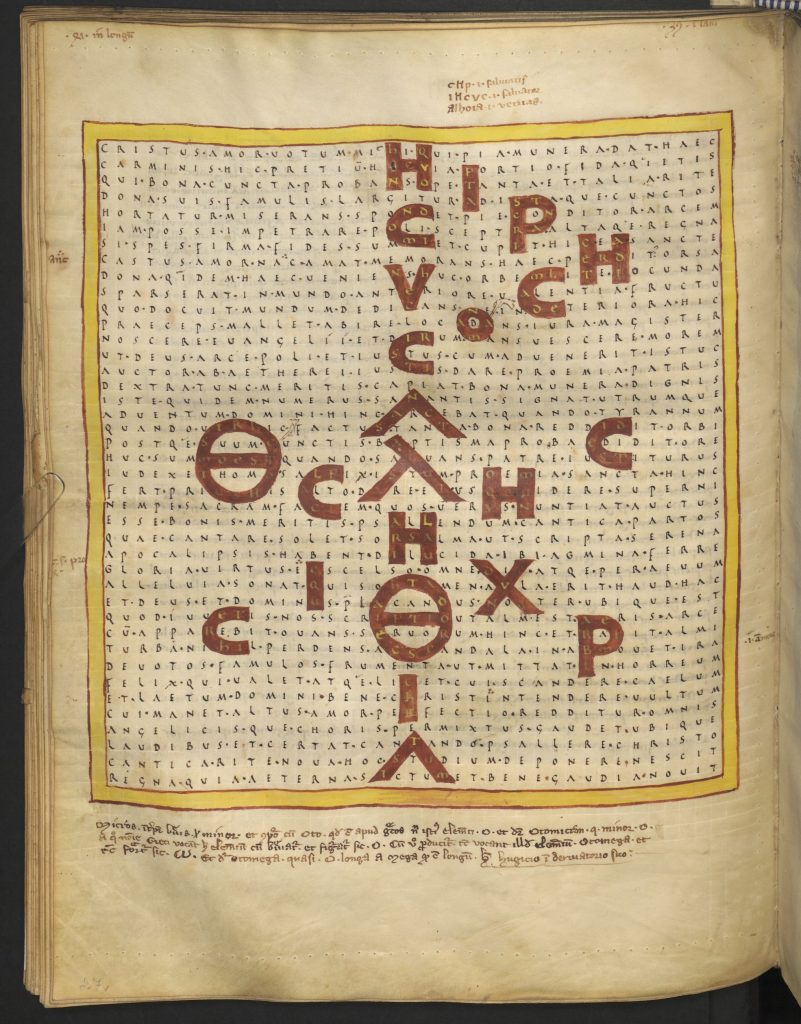






















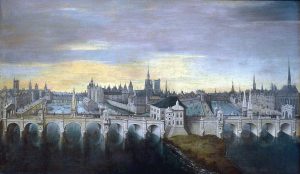



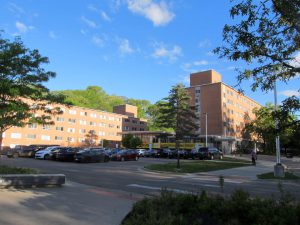

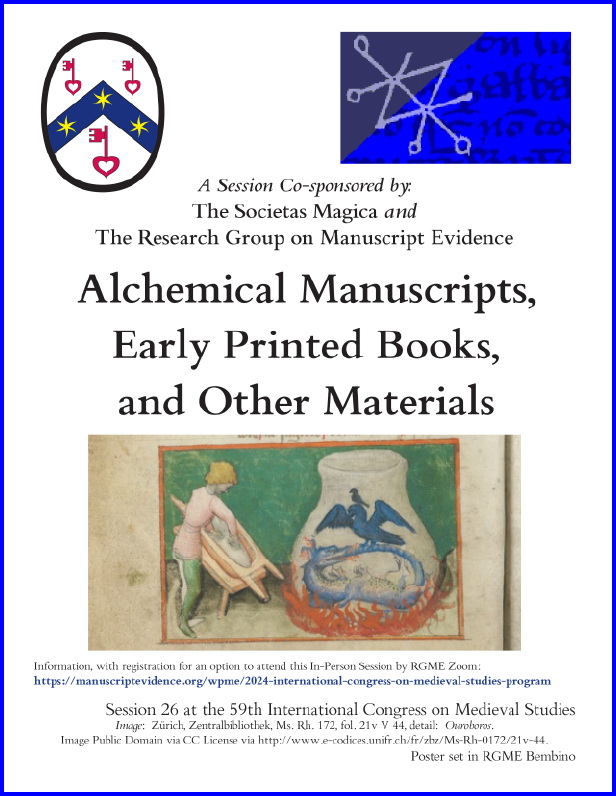
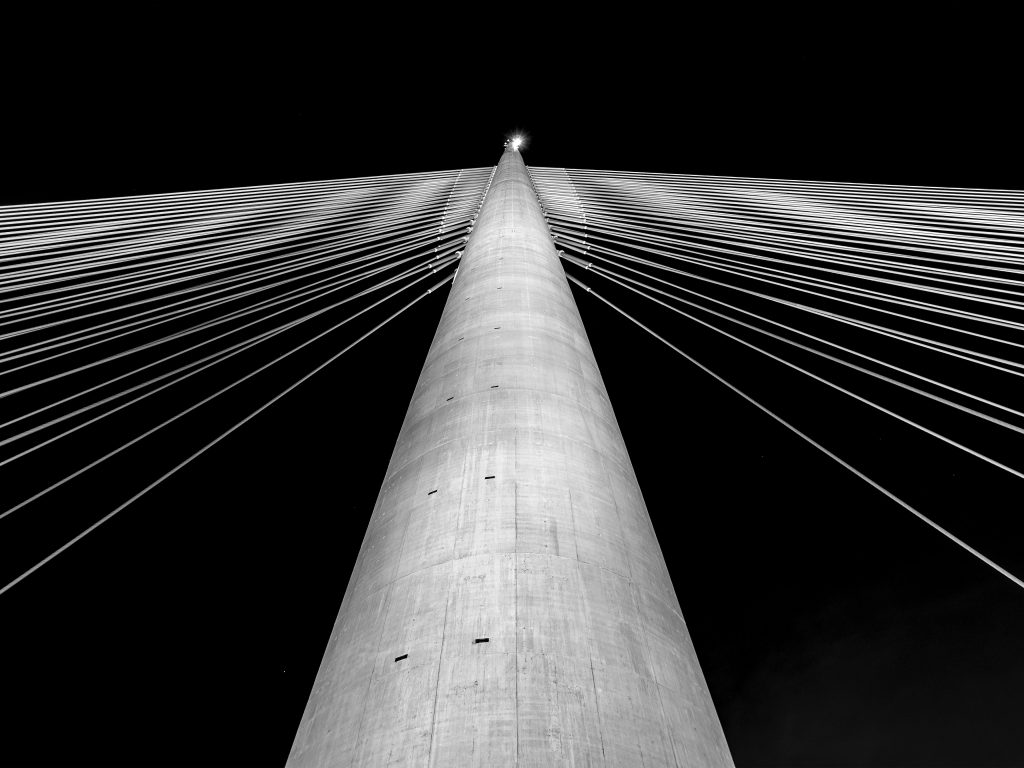

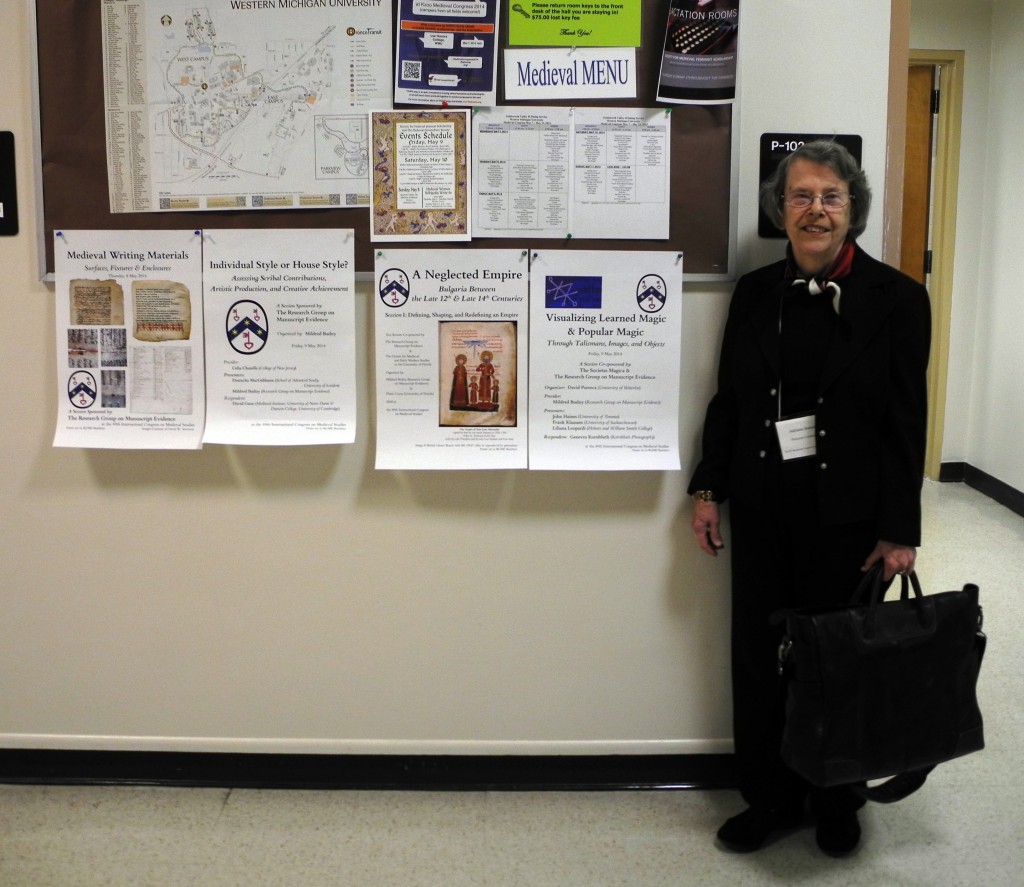
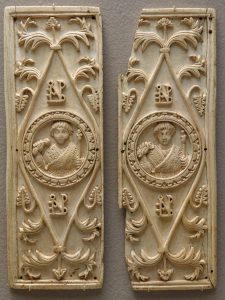

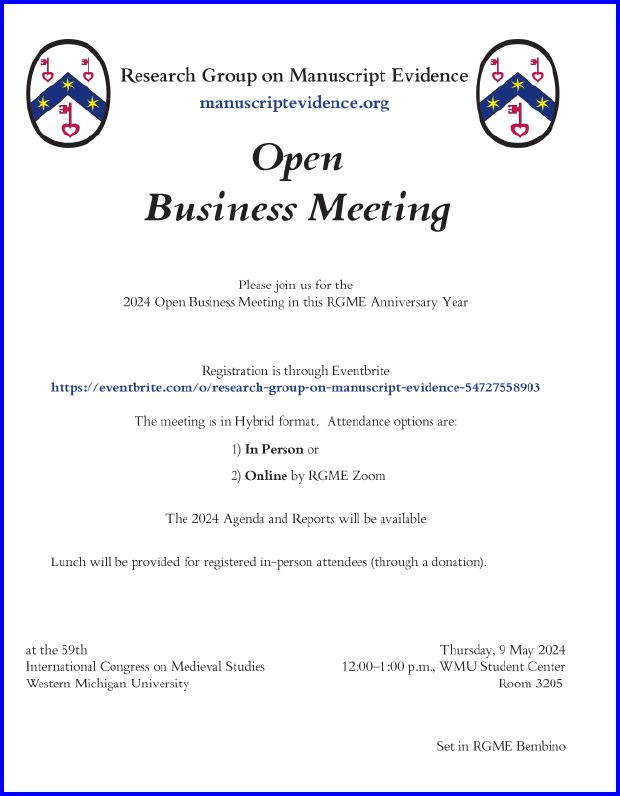
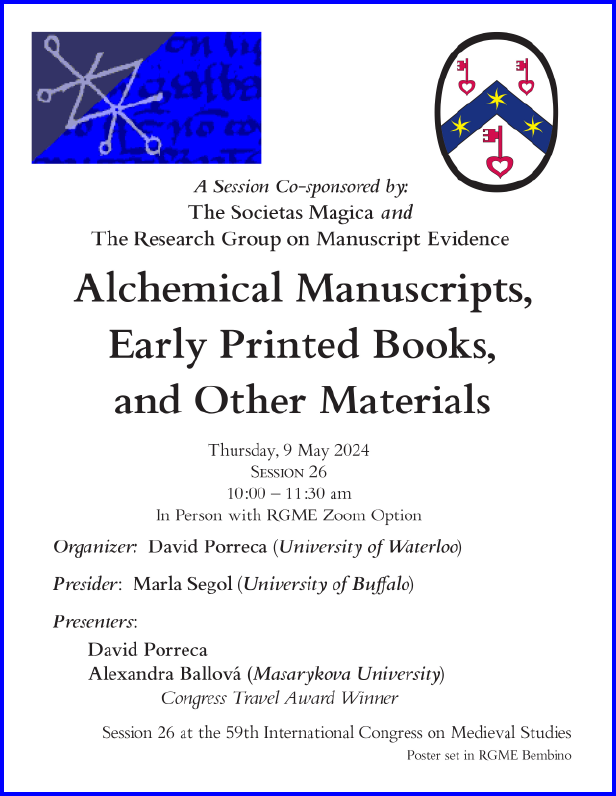
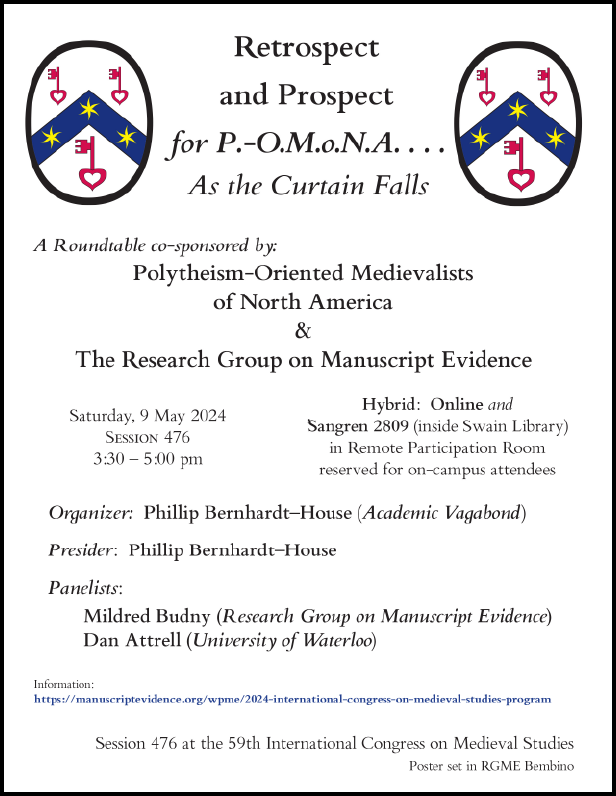
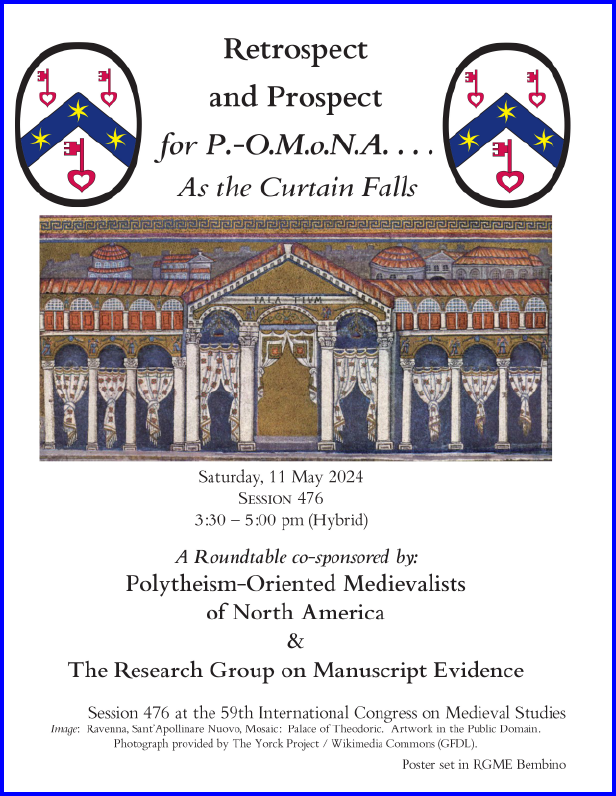
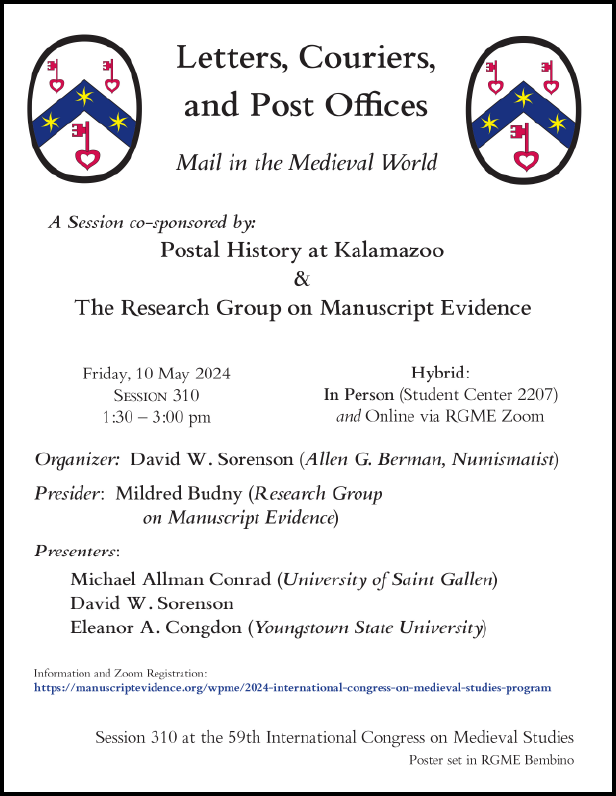
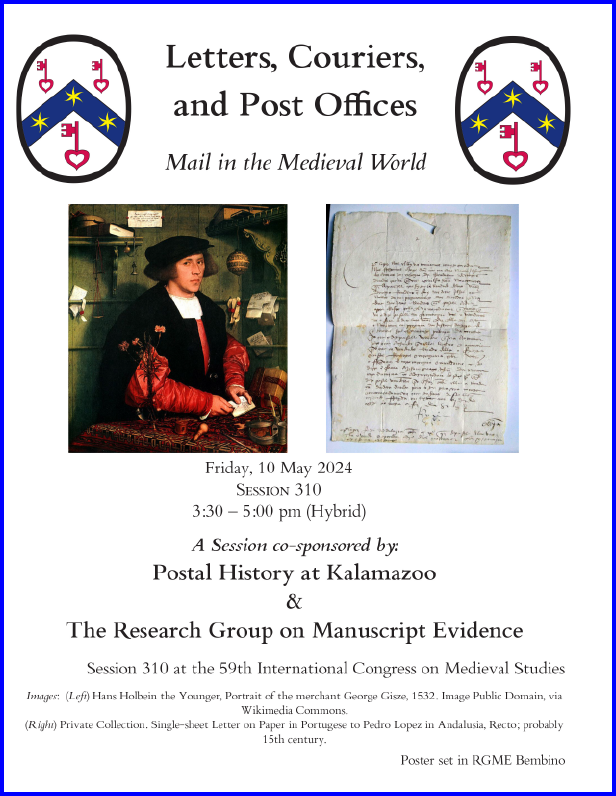
2025 International Congress on Medieval Studies: Program
April 16, 2025 in Conference, Conference Announcement, ICMS, International Congress on Medieval Studies, Kalamazoo, Manuscript Studies, POMONA, Postal History at Kalamazoo, Societas Magica
2025 International Congress
on Medieval Studies:
Program of RGME Activities
60th ICMS
Thursday through Saturday, 8–10 May 2025
(with Sessions variously
in Person, Online, or Hybrid)
[Posted on 16 January 2025, with updates]
With the shaping of the Program as a whole for the 2025 International Congress on Medieval Studies (ICMS), we announce the Program for the Activities sponsored and co-sponsored by the Research Group on Manuscript Evidence. They comprise sponsored and co-sponsored Sessions of Papers; and our Annual Open Business Meeting at the Congress.
For information about the 2025 Congress overall, see its website.
Los Angeles, Getty Center, Ms. Ludwig XV 7 (83.MR.177), fol. 1. Scipio and Guillaume de Loris Lying in Their Beds Dreaming. Image Public domain, via Wikimedia Commons.
Building upon our successful activities at the 2024 ICMS (see our 2024 International Congress on Medieval Studies Report), we prepared for the 2025 ICMS. First we proposed a set of sessions, sponsored and co-sponsored. Then, when they had been accepted by the Congress Committee, we issued the Call for Papers (CFP) for our proposed Sessions. The strength and number of the responses by the due date (15 September 2024) led us to seek, in some cases, two sessions in place of the one which we had proposed.
Now that the Congress Program itself has been scheduled, we can present the Program of our activities, both sponsored and co-sponsored.
We give thanks to our organizers, co-organizers, presenters, respondents, advisors, and the Congress.
Read the rest of this entry →
Tags: Almandal, Apocalypse Commentaries, Authorship, Beatus Manuscripts, Beatus of Saint-Sever, Divination, Dream Books, Grimoires, History of Magic, International Congress on Medieval Studies, Lapidario, Ludic Marginalia, Magic, Mail Delivery Networks, Manuscript studies, Old English Psychomacnia, Papal Prophecies, Petites Heures de Jean de Berry, Picatrix, Postal History, Postal History at Kalamazoo, Psychomachia, René d'Anjou, Sanas Cormaic, Societas Magica, Solomonic Magic, Women in Manuscripts
No Comments »